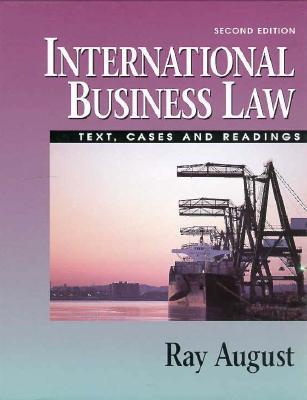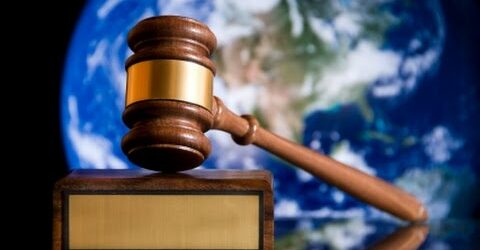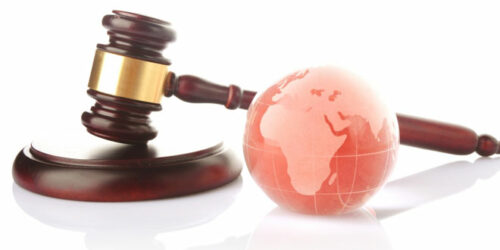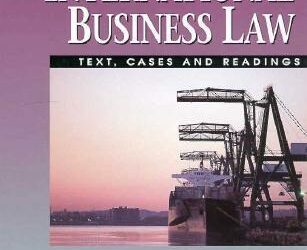International Business Law – August, Mayer, Bixby – Test Bank – Chapter 1 Introduction to International and Comparative Law – Questions & Answers

International Business Law – August, Mayer, Bixby – Test Bank – Chapter 1 Introduction to International and Comparative Law – Questions & Answers
True or False Questions
1. Equity is the practice between states of treating each other with goodwill and civility.
Answer: False
Diff: 1
Topic: What Is International Law?
Skill: Legal Concepts
2. A formal binding agreement between two states is called a multilateral treaty.
Answer: False
Diff: 1
Topic: The Making of International Law
Skill: Legal Concepts
3. Conventions are legally binding agreements between states sponsored by international organizations.
Answer: True
Diff: 1
Topic: Sources of International Law
Skill: Legal Concepts
4. The term “lex mercatoria” refers to theprinciples of law common to the world’s legal systems.
Answer: False
Diff: 1
Topic: Sources of International Law
Skill: Legal Concepts
5. Jus cogens is a peremptory norm of general international law, recognized by the international community of states as a norm from which no derogation is permitted.
Answer: True
Diff: 1
Topic: Sources of International Law
Skill: Legal Concepts
6. The doctrine of incorporation holds that customary international law is not applicable until clearly adopted by legislative action, judicial decision, or established local usage.
Answer: False
Diff: 1
Topic: The Scope of International Law in Actual Practice
Skill: Legal Concepts
7. Executive agreements are made according to the Constitution’s provisions.
Answer: False
Diff: 1
Topic: The Scope of International Law in Actual Practice
Skill: Legal Concepts
8. Recognitioncomes about by a unilateral declaration, and it can be either explicit (express) or implicit (tacit).
Answer: True
Diff: 1
Topic: International Persons
Skill: Legal Concepts
9. The declaratory doctrine holds that the legal existence of a government happens automatically by operation of law whenever a government is capable of controlling a territory and its people.
Answer: True
Diff: 1
Topic: International Persons
Skill: Legal Concepts
10. Servitude is the right of a government to exclusively exercise its powers within a particular territory.
Answer: False
Diff: 1
Topic: International Persons
Skill: Legal Concepts
11. A treaty concerned with rights over territory, such as boundaries and servitudes, is called a dispositive treaty.
Answer: True
Diff: 1
Topic: International Persons
Skill: Legal Concepts
12. If territory from one state shifts to another, the law of state succession applies the Merger Rule.
Answer: False
Diff: 1
Topic: International Persons
Skill: Legal Concepts
13. The private property rights of individuals lapse because of a change in government.
Answer: False
Diff: 2
Topic: International Persons
Skill: Legal Concepts
14. A charter is a document outlining the principles, functions, and organization of a juridical entity.
Answer: True
Diff: 1
Topic: International Persons
Skill: Legal Concepts
15. The United Nations is a nongovernmental organization.
Answer: False
Diff: 1
Topic: International Persons
Skill: Legal Concepts
16. The General Assembly is an organ of the United Nations.
Answer: True
Diff: 1
Topic: International Persons
Skill: Legal Concepts
17. The Security Council has 15 permanent member states.
Answer: False
Diff: 1
Topic: International Persons
Skill: Legal Concepts
18. European Union law within its scope of applicability is superior to the laws of the member states.
Answer: True
Diff: 1
Topic: International Persons
Skill: Legal Concepts
19. The European Commission is the administrative and executive arm of the EU.
Answer: True
Diff: 1
Topic: International Persons
Skill: Legal Concepts
20. Free trade areas are intergovernmental organizations.
Answer: True
Diff: 1
Topic: International Persons
Skill: Legal Concepts
21. All nongovernmental organizations are nonprofit organizations.
Answer: False
Diff: 1
Topic: International Persons
Skill: Legal Concepts
22. Transnational corporations are nonprofit organizations.
Answer: False
Diff: 1
Topic: International Persons
Skill: Legal Concepts
23. According to the law of state responsibility, the defendant can be from any state.
Answer: False
Diff: 2
Topic: The Rights of Individuals Under International Law
Skill: Legal Concepts
24. Common law is the legal system of England and countries that were once English colonies.
Answer: True
Diff: 1
Topic: Comparison of Municipal Legal Systems
Skill: Legal Concepts
25. Islamic law is the principal source of law in Saudi Arabia.
Answer: True
Diff: 1
Topic: Comparison of Municipal Legal Systems
Skill: Legal Concepts
Multiple Choice Questions
26. The practice or courtesy existing between states of treating each other with goodwill and civility is called ________.
A. comity
B. usus
C. jus commune
D. jus cogens
Answer: A
Diff: 1
Topic: What Is International Law?
Skill: Legal Concepts
27. A ________ is a legally binding agreement between two or more states.
A. convention
B. comity
C. treaty
D. estoppel
Answer: C
Diff: 1
Topic: Sources of International Law
Skill: Legal Concepts
28. ________ are legally binding agreements between states sponsored by international organizations.
A. Conventions
B. Doctrines
C. Treaties
D. Estoppels
Answer: A
Diff: 1
Topic: Sources of International Law
Skill: Legal Concepts
29. ________ is a peremptory norm of general international law, recognized by the international community of states as a norm from which no derogation is permitted.
A. Public law
B. Jus commune
C. Jus cogens
D. Civil law
Answer: C
Diff: 1
Topic: Sources of International Law
Skill: Legal Concepts
30. Customary international law is part of domestic law to the extent that it is not inconsistent. This is called the ________.
A. constitutive doctrine
B. declaratory doctrine
C. doctrine of transformation
D. doctrine of incorporation
Answer: D
Diff: 1
Topic: The Scope of International Law in Actual Practice
Skill: Legal Concepts
31. Customary international law is applicable domestically only after it is adopted by legislation, court decision, or local usage. This is called the ________.
A. constitutive doctrine
B. declaratory doctrine
C. doctrine of transformation
D. doctrine of incorporation
Answer: C
Diff: 1
Topic: The Scope of International Law in Actual Practice
Skill: Legal Concepts
32. Which of the following best describes a self-executing treaty?
A. It is a treaty that requires state parties to enact enabling legislation before it becomes effective domestically.
B. It is a treaty containing a term that says that it is directly effective within the signatory states upon ratification.
C. It is a treaty adopted according to the constitutional provisions of the ratifying state.
D. It is a treaty or international agreement entered into by a state’s executive without following the state’s constitutionally required ratification procedure.
Answer: B
Diff: 2
Topic: The Scope of International Law in Actual Practice
Skill: Legal Concepts
33. A treaty that requires state parties to enact enabling legislation before it becomes effective domestically is known as a ________ treaty.
A. bilateral
B. dispositive
C. constitutional
D. non-self-executing
Answer: D
Diff: 1
Topic: The Scope of International Law in Actual Practice
Skill: Legal Concepts
34. Which of the following best describes an executive agreement?
A. It is a treaty or international agreement entered into by a state’s executive without following the state’s constitutionally required ratification procedure.
B. It is a treaty adopted according to the constitutional provisions of the ratifying state.
C. It gives a person the right to use another person’s property.
D. It is a document outlining the principles, functions, and organization of a juridical entity.
Answer: A
Diff: 2
Topic: The Scope of International Law in Actual Practice
Skill: Legal Concepts
35. The ________ holds that the legal existence of a state or government happens automatically by operation of law.
A. doctrine of transformation
B. declaratory doctrine
C. constitutive doctrine
D. doctrine of incorporation
Answer: B
Diff: 1
Topic: International Persons
Skill: Legal Concepts
36. The ________ holds that the legal existence of a state or government is dependent on recognition by other states.
A. doctrine of transformation
B. declaratory doctrine
C. constitutive doctrine
D. doctrine of incorporation
Answer: C
Diff: 1
Topic: International Persons
Skill: Legal Concepts
37. Which of the following terms refers to a right to the use of another’s property?
A. usus
B. charter
C. servitude
D. comity
Answer: C
Diff: 1
Topic: International Persons
Skill: Legal Concepts
38. ________ is a legal rule that one cannot make an allegation or denial of fact that is contrary to one’s previous actions or words.
A. Estoppel
B. Jus cogens
C. Servitude
D. Charter
Answer: A
Diff: 1
Topic: International Persons
Skill: Legal Concepts
39. A treaty concerned with rights over territory, such as boundaries and servitudes is called the ________.
A. executive agreement
B. constitutional treaty
C. self-executing treaty
D. dispositive treaty
Answer: D
Diff: 1
Topic: International Persons
Skill: Legal Concepts
40. The ________ holds that a new state coming into existence through decolonization is under no obligation to succeed to the treaties of its former colonial power.
A. doctrine of incorporation
B. declaratory doctrine
C. Clean slate doctrine
D. constitutive doctrine
Answer: C
Diff: 1
Topic: International Persons
Skill: Legal Concepts
41. A(n) ________ is a document outlining the principles, functions, and organization of a juridical entity.
A. charter
B. convention
C. self-executing treaty
D. dispositive treaty
Answer: A
Diff: 1
Topic: International Persons
Skill: Legal Concepts
42. The United Nations is a type of ________.
A. transnational corporation
B. nonprofit non-governmental organization
C. intergovernmental organization
D. multinational enterprise
Answer: C
Diff: 2
Topic: International Persons
Skill: Legal Concepts
43. Which of the following is a permanent member of the Security Council?
A. the United States
B. India
C. Brazil
D. Germany
Answer: A
Diff: 1
Topic: International Persons
Skill: Legal Concepts
44. The ________ is the main decision-making body of the European Union.
A. European Economic and Social Committee
B. European Commission
C. European Parliament
D. Council of the European Union
Answer: D
Diff: 1
Topic: International Persons
Skill: Legal Concepts
45. Which of the following is a function of the Council of the European Union?
A. It is responsible for overseeing the implementation of the treaties that establish the EU.
B. It coordinates the economic policies of the member states.
C. It acts as the principal initiator of overall policy for the EU.
D. It represents the EU internationally.
Answer: B
Diff: 2
Topic: International Persons
Skill: Legal Concepts
46. Which of the following is a function of the European Council?
A. It is responsible for overseeing the implementation of the treaties that establish the EU.
B. It coordinates the economic policies of the member states.
C. It acts as the principal initiator of overall policy for the EU.
D. It represents the EU internationally.
Answer: C
Diff: 2
Topic: International Persons
Skill: Legal Concepts
47. Which of the following is a function of the European Commission?
A. It acts as the principal initiator of overall policy for the EU.
B. It drafts legislation for submission to the Council and the Parliament.
C. It determines the EU’s annual budget in conjunction with the Council of the EU.
D. It coordinates the economic policies of the member states.
Answer: B
Diff: 2
Topic: International Persons
Skill: Legal Concepts
48. The ________ is responsible for carrying out the EU’s monetary policy.
A. European Commission
B. European Court of Auditors
C. European Central Bank
D. European Economic and Social Committee
Answer: C
Diff: 1
Topic: International Persons
Skill: Legal Concepts
49. A group of states that have reduced or eliminated trade barriers among themselves and have established a common external tariff is called ________.
A. the United Nations System
B. a free trade area
C. an economic consultative association
D. a customs union
Answer: D
Diff: 1
Topic: International Persons
Skill: Legal Concepts
50. A group of states that have reduced or eliminated trade barriers among themselves but maintain their individual tariffs in dealing with other states is called ________.
A. a customs union
B. a free trade area
C. the United Nations System
D. an economic consultative association
Answer: B
Diff: 1
Topic: International Persons
Skill: Legal Concepts
51. Which of the following best describes an economic consultative association?
A. It is a group of states that have reduced or eliminated trade barriers among themselves but maintain their individual tariffs in dealing with other states.
B. It is a group of states that exchanges information, coordinates economic policy, and promotes trade cooperation.
C. It is a business firm operating branches, subsidiaries, or joint ventures in two or more states.
D. It is a group of states that have reduced or eliminated trade barriers among themselves and have established a common external tariff.
Answer: B
Diff: 1
Topic: International Persons
Skill: Legal Concepts
52. Greenpeace and Amnesty International are examples of ________.
A. nongovernmental organizations
B. economic consultative associations
C. general intergovernmental organizations
D. special intergovernmental organizations
Answer: A
Diff: 1
Topic: International Persons
Skill: Legal Concepts
53. A(n) ________ is a business firm operating branches, subsidiaries, or joint ventures in two or more states.
A. multinational enterprise
B. economic consultative association
C. for-profit NGO
D. intergovernmental organization
Answer: A
Diff: 1
Topic: International Persons
Skill: Legal Concepts
54. Which of the following characterizes arbitration?
A. It is the liability of a state for the injuries that it causes to foreign persons.
B. It is the process by which parties to a dispute submit their differences to the judgment of an impartial third person or group selected by mutual consent.
C. It is the basic rights intended to protect all people from cruel and inhumane treatment, threats to their lives, and persecution.
D. It is justice applied in circumstances not covered by rules of law.
Answer: B
Diff: 3
Topic: International Persons
Skill: Legal Concepts
55. Which of the following is true of international human rights law?
A. Individuals can claim any loss of property or personal injury.
B. Individuals have the right to assert claim against the state of their nationality.
C. The claimant is the state of which the injured individual is a national.
D. The defendant is always a foreign state.
Answer: B
Diff: 3
Topic: The Rights of Individuals Under International Law
Skill: Legal Concepts
56. Which among the following is commonly called the civil law?
A. Shari’a
B. common law
C. public law
D. the Romano-Germanic legal system
Answer: D
Diff: 1
Topic: Comparison of Municipal Legal Systems
Skill: Legal Concepts
57. The common law of Europe is called the ________.
A. lex mercatoria
B. jus commune
C. jus cogens
D. Shari’a
Answer: B
Diff: 2
Topic: Comparison of Municipal Legal Systems
Skill: Legal Concepts
58. The common commercial rules and procedures used throughout Europe in the Renaissance are known as the ________.
A. Shari’a
B. jus cogens
C. jus commune
D. lex mercatoria
Answer: D
Diff: 1
Topic: Comparison of Municipal Legal Systems
Skill: Legal Concepts
59. The ________ was promulgated in 1804 by Napoléon.
A. jus commune
B. German Civil Code
C. French Civil Code
D. common law
Answer: C
Diff: 1
Topic: Comparison of Municipal Legal Systems
Skill: Legal Concepts
60. The ________ is the law code promulgated in 1896 that is based primarily on the Corpus Juris Civilis and is characterized by its detailed structure and its technical precision.
A. comparative law
B. German Civil Code
C. French Civil Code
D. common law
Answer: B
Diff: 1
Topic: Comparison of Municipal Legal Systems
Skill: Legal Concepts
61. Constitutional and administrative law is called the ________.
A. common law
B. public law
C. civil law
D. Shari’a
Answer: B
Diff: 1
Topic: Comparison of Municipal Legal Systems
Skill: Legal Concepts
62. The ________ is the legal system of England and countries that were once English colonies.
A. Shari’a
B. public law
C. common law
D. civil law
Answer: C
Diff: 2
Topic: Comparison of Municipal Legal Systems
Skill: Legal Concepts
63. A doctrine which states that all persons, including the sovereign, are subordinate to the rule of law is called the ________.
A. Clean slate doctrine
B. Estrada doctrine
C. supremacy of the law
D. state responsibility
Answer: C
Diff: 2
Topic: Comparison of Municipal Legal Systems
Skill: Legal Concepts
64. ________ is the law and court with jurisdiction over maritime affairs in general.
A. Equity
B. Public law
C. Common law
D. Admiralty
Answer: D
Diff: 1
Topic: Comparison of Municipal Legal Systems
Skill: Legal Concepts
65. ________ is based on principles found in the Koran and related writings.
A. Jus commune
B. Corpus Juris Civilis
C. Shari’a
D. Lex mercatoria
Answer: C
Diff: 1
Topic: Comparison of Municipal Legal Systems
Skill: Legal Concepts
Essay Questions
66. Distinguish between treaties and conventions.
Answer: In international law the equivalents of legislation are treaties and conventions. Treaties are legally binding agreements between two or more states. Conventions are legally binding agreements between states sponsored by international organizations, such as the United Nations. Both are binding upon states because of a shared sense of commitment and because one state fears that if it does not respect its promises, other states will not respect their promises.
Diff: 3
Topic: Sources of International Law
Skill: Legal Concepts
67. What are the three different types of states?
Answer: The three different types of states are independent state, dependent state, and inchoate state. Independent states are free from the political control of other states and free to enter into agreements with other international persons. Dependent states have formally surrendered some aspect of their political and governmental functions to another state. Inchoate states are the ones that have begun but not completed. They are imperfectly formed or developed.
Diff: 3
Topic: International Persons
Skill: Legal Concepts
68. What is the difference between the Merger Rule and the Moving Boundaries Rule?
Answer: Merger Rule is the legal rule that the treaties in effect in a former state remain in effect in its territory when it becomes part of a new state. If territory from one state shifts to another, the law of state succession applies the Moving Boundaries Rule. This holds that the treaties of the absorbing state displace the treaties of the receding state in the territory where sovereignty has changed.
Diff: 3
Topic: International Persons
Skill: Legal Concepts
69. Enlist the organs of the United Nations.
Answer: The organs of the United Nations are the General Assembly, the Security Council, the Secretariat, the International Court of Justice, the Trusteeship Council, and the Economic and Social Council (ECOSOC).
Diff: 1
Topic: International Persons
Skill: Legal Concepts
70. Explain supranational powers.
Answer: Unlike most other intergovernmental organizations, the EU is endowed with supranational powers. That is, EU law within its scope of applicability is superior to the laws of the member states. This “supremacy principle” has two consequences: (1) the member states are required to bring their internal laws into compliance with EU law and (2) EU law is directly effective within the member states.
Diff: 2
Topic: International Persons
Skill: Legal Concepts
71. What are the various functions of the Council of the European Union?
Answer: The Council of the European Union is the main decision-making body of the EU. It exercises co-decision with the European Parliament on a wide array of community issues. Its role is to (1) adopt legislation in conjunction with the Parliament, (2) adopt an annual budget, also in conjunction with Parliament, (3) adopt international agreements, and (4) coordinate the economic policies of the member states.
Diff: 2
Topic: International Persons
Skill: Legal Concepts
72. What are the two types of intergovernmental organizations?
Answer: IGOs can be categorized into two basic groups: (1) general IGOs that have competence in a wide variety of fields, including politics, security, culture, and economics, like the United Nations, and (2) specialized IGOs that limit their activities to a particular field.
Diff: 2
Topic: International Persons
Skill: Legal Concepts
73. Distinguish between customs union and free trade area.
Answer: A group of states that have reduced or eliminated trade barriers among themselves and have established a common external tariff is called the customs union. A group of states that have reduced or eliminated trade barriers among themselves but maintain their individual tariffs in dealing with other states is called the free trade area.
Diff: 2
Topic: International Persons
Skill: Legal Concepts
74. Explain the Romano-Germanic Civil Law System.
Answer: The oldest and most influential legal family is the Romano-Germanic legal system, commonly called the civil law. The civil law dates to 450 b.c., the traditional date when Rome adopted its Twelve Tables. The most significant event in the historical development of the civil law, however, was the compilation and codification of all Roman law under the direction of the Byzantine Emperor Justinian. This code, known as the Corpus Juris Civilis, was compiled between 528 and 534 a.d. It was important because it preserved in written form the ancient legal system.
Diff: 3
Topic: Comparison of Municipal Legal Systems
Skill: Legal Concepts
75. How does the Islamic legal system function?
Answer: The Islamic legal system is known as Shari’a. It is derived from the following sources, in the order of their importance: (1) the Koran, (2) the Sunna or traditional teachings and practices of the Prophet Muhammad (570–632 a.d.), (3) the writings of Islamic scholars who derived rules by analogy from the principles established in the Koran and the Sunna, and (4) the consensus of the legal community. In the tenth century a.d., three centuries after the founding of Islam, the legal community decided that further improvement of the scholars’ analysis of divine law was impossible. They decided at that time to “close the door of ijtihad (independent reasoning),” freezing the evolution of Islamic law. As a consequence, Shari’a judges and scholars may only apply the law as it was set down by the early writers. They may not change, modify, or extend that law.
Diff: 3
Topic: Comparison of Municipal Legal Systems
Skill: Legal Concepts





